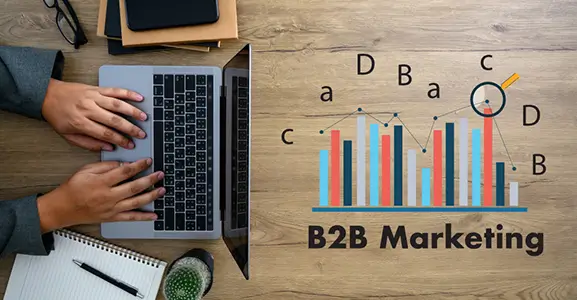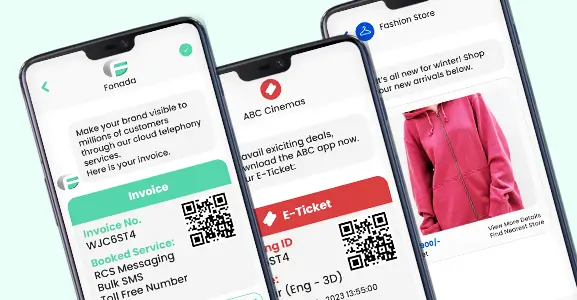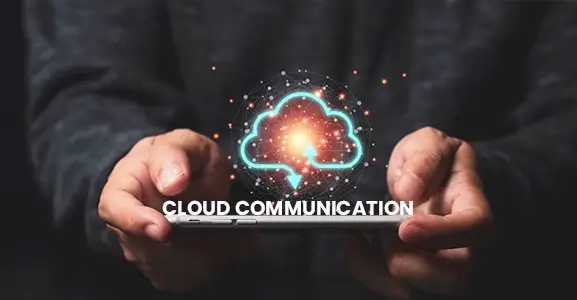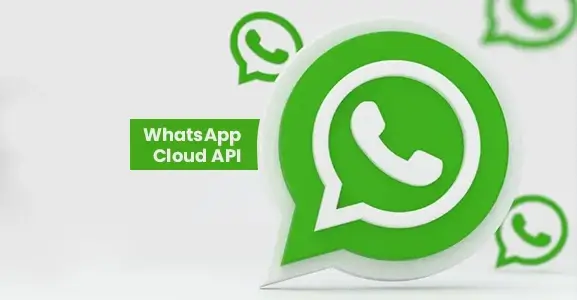Business marketing differs from consumer marketing. There are unique differences between the business and consumer markets regarding selling. You must approach B2B (business-to-business) marketing with a different strategy. Successful B2B marketing requires time and effort for execution. Marketers must meticulously develop a marketing plan, including creative needs, budget constraints, and channel decisions.
We’ll go through the basics of B2B marketing, including what are B2B business, its significance, and strategies.
What Is B2B Marketing?
Business-to-business or B2B marketing promotes goods or services from one company to another. It’s used for businesses that sell products or services for other businesses. B2B marketing follows marketing practice curated to generate sales from other businesses. It focuses on the requirements, interests, and difficulties of individuals who purchase for or on an organization’s behalf.
B2B marketing can help you grab and hold a prospect’s attention for B2B lead generations. It can also help you procure leads that can be converted into customers. Understanding the dynamics of the business-2-business market is essential for successful marketing to other companies. Important factors to consider include:
1. Target Audience: Determine your audience by identifying their industry, organization size, job titles, and problems. This will help you create an ideal customer profile (ICP).
2. Decision Making: Understand the complicated buying process, which involves a lot of different parties and decision-makers.
3. Value Proposition: Explain how the good or service you sell addresses specific business issues and delivers quality to the target audience.
Example Of Successful B2B Marketing
B2B marketing has several principles, activities, and strategies. The t-shirts we buy are a great illustration of B2B marketing. Beginning with cotton or another fibre, a complex value chain ensues in which cloth is woven, a garment is produced, packaging and distribution occur at multiple stages, and eventually, the product is available for purchase.
Cotton is distributed through a supply chain beginning with producers and ending with garment manufacturers. None of the enterprises purchase the products for enjoyment. They’re buying them intending to add value to distribute them further down the supply chain until they reach us.
Thus, B2B selling is about satisfying the demands of other companies, though consumers at home will likely buy their products.
Various Types Of B2B Markets
Understanding the various types of B2B markets is essential for developing a successful marketing plan among business and marketing leaders. There are four major players in these markets: producers, resellers, governments, and institutions. Each B2B business category has its set of features, target audience, and buying habits:
1. Producers
B2B companies sell goods and services to producers, who use them to make something else. Producers are companies that make things and sell them to other enterprises. They are also called OEMs, “original equipment manufacturers.” Others, however, prefer to deal exclusively with the end user. In today’s highly competitive industry, producers must be innovative, offer superior goods, and develop loyal clientele to succeed.
2. Resellers
Since resellers are familiar with their customers, they can customise solutions to meet their needs. When marketing to resellers, you should demonstrate how the good or service can assist them in differentiating themselves from competitors. You can do this by pointing out the unique things about your product or by giving them custom solutions that meet their needs.
3. Governments
Governments are the largest purchasers worldwide. They make purchases in the areas of technology, construction, and consultancy. Government contracts have the potential to be lucrative, but they also come with several stringent requirements. Selling to the government requires expertise in procurement and contract policies.
4. Institutions
Institutions that are nonprofits provide research, healthcare, and education. Budget-conscious organisations require cost-effective solutions.
Institutional marketing requires demonstrating value. Show off the unique things about your goods or offer custom solutions to meet their needs. Please confirm that you’ve worked with comparable institutions and understand their requirements.
Developing A Successful B2B Marketing Strategy
The key to success in business-to-business marketing is creating a comprehensive plan. Consider the following factors:
1. Achievable goals and targets: Set clear, measurable goals that align with your business’s goals.
2. Targeted messaging: Create captivating and customised messages that address your target audience’s requirements.
3. Content marketing: Whitepapers, research studies, and blog posts that address problem areas will establish your organisation as a business thought leader.
4. ABM, or Account-Based Marketing: Use account-based marketing strategies to focus on a select group of high-value clients.
5. Lead Generation and Management: Use email, social media marketing, and webinars to generate leads and create nurturing programs to keep them interested.
Best Customer Engagement Practices For B2B Marketing
Revenue-generating B2B campaigns require two elements. They align the team with best practices. Adhering to best practices will help your business become more unified and efficient in its approach to B2B selling.
Here Are The Top B2B Marketing Practices
1. Know The Buyer’s Journey For B2B
A journey map is a customised buyer’s journey that depicts your brand’s interactions with prospects. That information helps you determine which marketing methods, like content marketing, work best for internet communication. B2B buyers go through three stages:
Awareness Stage: The prospect learns about the problem and initiates self-education.
Stage of Consideration: The prospect investigates potential solutions for their current issue.
Decision Phase: The prospect is prepared to purchase or formally start the buying procedure.
2. Determine Your Market And Audience
First up, identify your target market. Such as,
- Size of the company
- Company location or region
- Organisational sector
- Number of staff members
- Revenue
Then, determine your target audience. These are the particular human prospect who seeks your brand’s products or services. Using demographic and psychographic data, you can identify individual marketing prospects. This can assist you in learning their buying habits and preferred marketing channels.
3. Develop B2B Marketing Plans And Strategies
Develop a B2B business plan and strategy after defining your marketing mix. A marketing plan is a detailed road map outlining the channels and analytics that will be used to put your marketing strategy into action. Spend more time preparing to save marketing expenditures and boost ROI. B2B marketing relies on strategy.
4. Make Visuals
No one reads a blog with long paragraphs. Business-to-business content marketing can be varied! Videos, animated GIFs, data visualisations, and high-quality photos enhance blogs, websites, and marketing initiatives. Visual content encourages consumer engagement and boosts the brand image.
Your B2B Company should cover most of these.
- Developing a website
- Managing social media accounts
- Email newsletters
- Participating in trade shows and conferences
5. Establish A Brand Image
A brand persona is the best way to improve your company’s image. Brand awareness and consistency will boost your B2B market position. This can help you build a unified brand identity across marketing channels. Sharing brand campaigns via email signatures is an example of business-2-business marketing.
6. The Emphasis On Pain Points
You can optimise leads and customer journeys using channels, plans, and tools based on customer groups and competitive analyses. Knowing your customers helps you improve their lives. Buyers look for solutions to their problems, not sales pitches. If you solve their challenges with the most effective B2B marketing solution, you’ll be their preferred provider for years.
7. Experimentation Is Important
Do competitive analyses to understand better how to choose your marketing tactics. You will succeed in the B2B business if you put in much effort, persevere, conduct A/B tests, and experiment. Remember that the SaaS marketing business is constantly changing, so you need to keep up with the latest developments and trends.
8. Focus On Testimonials, Reviews, And Case Studies
Existing customer testimonials, assessments, and case studies are utilised in one of the most effective B2B marketing strategies. It establishes credibility because of prospective consumers who want to know the features of your products or services.
B2B digital marketing needs reviews and testimonials. Online reviews can promote brand awareness, raise search engine rankings, and boost CTRs for organic results and Google Ads.
Case studies are essential for enabling consumers to make purchasing decisions. A case study of an equivalent customer may serve as the evidence your prospects require before making a significant buying decision.
Latest B2B Marketing Trends
Hybrid business models are one of the most recent developments in this sector. The dark funnel, Web.30, and underpriced attention have become more prevalent.
These changes will necessitate that B2B marketers become more adaptable and more efficient in their responses. Consequently, it will be more essential than ever to track business-2-business data.
1. Concentrate On Customisation
B2B marketers want to customize their messaging in this hyper-personalized age. This requires targeting specific demographics with their marketing efforts and content rather than appealing to everyone. Numerous strategies, such as account-based marketing, consumer personas, and customer engagement marketing, can facilitate personalisation.
2. Accept The Benefits Of AI
AI is changing B2B marketing. AI-powered platforms can assist in automating operations like data analysis, lead assessment, conversational marketing chatbot and content creation. AI can help B2B marketers obtain vital insights about their target audiences and design more effective campaigns.
3. Video Marketing
B2B marketers are increasingly using video marketing. Video is an efficient way to engage with clients and prospects, especially with the development of remote work, video conferences, and webinars. B2B marketers may use video to promote their products and services, convey thought leadership, and establish relationships.
4. Account-Based Marketing (ABM)
ABM targets specific accounts, not a broad audience. This approach involves making campaigns for specific accounts, getting to know the people who make important decisions, and giving people customised content and experiences.
5. Social Media Promotion
B2B marketers can engage with their target audience and distribute content with the help of social media. B2B marketers will use social media in 2023 to increase brand awareness, website traffic, and leads. B2B marketers benefit from LinkedIn, Twitter, and YouTube.
6. Consider The Customer Experience
In 2023, business-to-business marketing will still strongly emphasise delivering outstanding customer service. This means knowing clients’ pain areas, desires, and preferences and personalising messaging and strategies. With client feedback, B2B marketers can improve their products and services and provide a more streamlined customer experience.
7. Influencer Promotion
Influencer marketing is an effective strategy for reaching new audiences and establishing consumer trust. Influencers will continue to promote B2B products and services, distribute creativity in thought, and boost engagement in 2023. Influencers can assist B2B brands in expanding their reach, establishing their credibility, and establishing themselves as market leaders.
8. Data-Driven Marketing
Data-driven marketing will continue to have a significant impact on B2B marketing. Data helps B2B marketers understand their consumers, follow campaigns and evaluate ROI. B2B marketers may improve campaigns by using data.
9. Mobile Optimisation
The importance of mobile optimisation in business-to-business marketing is rising. B2B marketers must optimise the user experience and campaigns for mobile as more consumers use mobile devices for information and business. This requires mobile-friendly content, fast load speeds, and a seamless mobile experience.
10. Digital And Hybrid Events
After the COVID-19 outbreak, Digital and hybrid events will remain popular in 2023. B2B marketers can communicate with their audience via virtual and hybrid events.
5 Strategies For The B2B Business Plan
The B2B buyer’s experience differs from the consumer buying process because you are selling to a group of people rather than a single person. Prospecting, demonstrating, and closing are no longer the only processes in the technique. It’s all about educating people, providing value, and solving their problems.
You’ll need to develop a customer focused marketing strategy to win sales opportunities. Here are five guidelines to help you create an effective B2B marketing strategy for the business world.
1. Set Up Your TAM
Define your target market and the Total Addressable Market (TAM). This is a crucial B2B product marketing step since it helps you focus on qualified prospects.
2. Determine Your Objectives
Set measurable objectives for every member of the marketing team. By monitoring B2B marketing analytics and KPIs, you can optimise your team’s performance and remain on top of its advancement.
3. Develop An Economic Proposition
Consider your unique selling proposition. The next step is determining the messages and value drivers you will use with each specific demographic and vital account.
4. Plan To Reach Out
Use your gathered information, design a strategy for creating outreach content to increase revenues.
5. Create Content
Start making educational content that grows brand awareness, drives demand, and adds value.
Taking Advantage Of Digital Channels
B2B selling relies on digital platforms to reach customers. Consider the following critical elements of digital strategy:
1. Optimising a Website: Create a user-friendly, SEO-optimized website that shows your products/services and delivers essential information.
2. SEM, or Search Engine Marketing: You should run paid search advertising to boost exposure and attract qualified website visitors.
3. Publicity Using Social Media: Engage with your audience, provide relevant information, and develop brand awareness on LinkedIn, Twitter, and Facebook.
4. Email Marketing: Create personalised email campaigns and targeted email lists to nurture prospects and retain customer relationships.
5. Influencer Marketing: Work together with influential people in the industry to increase your credibility and reach inside your target market.
6. Marketing Automation: Use tools to streamline procedures, track consumer interactions, and personalise experiences.
Why Use Digital Business-To-Business Marketing ?
B2B enterprises may increase brand awareness, online traffic, leads, and sales through digital marketing. The most significant advantages of B2B digital marketing are as follows:
- In comparison to conventional methods, digital marketing saves money
- Multiple marketing channels can increase business opportunities
- Digital marketing campaigns allow you to interact with B2B purchasers
- B2B Digital Marketing Targets Ideal Customers
- You Can Evaluate Your Digital Marketing Strategy’s Performance
- Digital B2B marketing can contribute to high ROI
Conclusion
B2B marketing involves a solid grasp of the target demographic, a well-defined plan, and an excellent online presence. Businesses can design effective B2B marketing efforts that engage customers, generate leads, and build long-term relationships through customised messages, digital platforms, monitoring performance, and keeping ahead of trends.
To succeed in today’s B2B market, you must be agile, responsive to customer requirements, and committed to continuous improvement.
FAQs
B2B marketing promotes products and services to other businesses to improve their operations. B2B marketing introduces companies to your brand, goods, and services and transforms them into consumers.
Business-to-business, or B2B, is a transaction between companies, like manufacturers and wholesalers or wholesalers and retailers. It means a company does business with another company instead of a single buyer.
One example of a business-to-business transaction is the practice of wholesalers selling to retailers. Business-to-business transactions also include companies that manufacture and distribute automotive parts.
The importance of B2B marketing can influence consumer purchasing. It facilitates brand development across channels. Business-to-business buyers are more inclined to buy if they know about your good or service and its value.
B2B marketing is built on your products and services. It is also intended for business use rather than consumer use. B2B marketing relies on content, connection, communications, and conversion.
The increasing number of B2B brands suggests a prosperous future for B2B marketers. Society has changed B2B marketing’s consumer engagement.
1. Know Your Customer
2. Establish Objectives and Metrics
3. Develop an Execution Strategy
4. Produce Content
Your industry, audience, and goals will determine the ideal B2B marketing strategy. Using more than one strategy is often more successful than using just one. To reach your audience, you must understand their desires and pain areas.
Target audiences distinguish these two marketing methods. B2C marketers target individual consumers, whereas B2B marketers interact with the brands of decision-making teams. B2B marketing emphasises education to help consumers become industry leaders.
B2B business promotions target executive-level buyers. By better-serving customers, these strategies can boost brand loyalty and lifetime value. This improves brand experiences and reduces churn. B2B marketing allows brands to interact with a developing market.
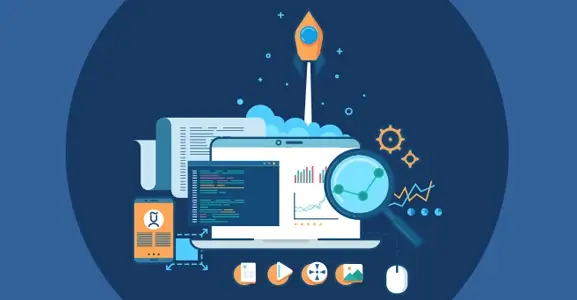
Dec 11, 2024
Top Contact Center Optimization Tools For 2024
“A thriving business knows how to fetch maximum output from limited resources by optimizing ca... Read More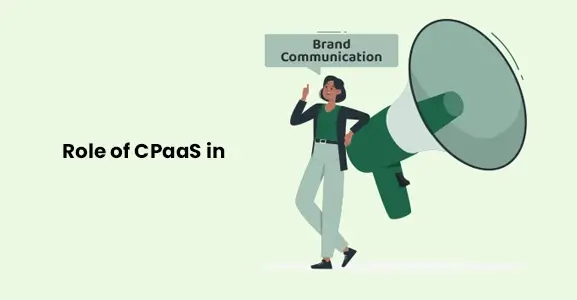
Nov 13, 2024
What Is Brand Communication? CPaaS Role Explained
Did you ever wonder why some advertisements grab your attention instantly, while others do not? The... Read More
Nov 01, 2024
What Is Automated Messaging And How Does It Work?
Automated messaging or text automation empowers businesses and marketing professionals to connect wi... Read MoreLatest Updates
From Fonada
Industry Insights, Trends, Innovations, Updates, and Case Studies from Industry Experts
View
Customer
Reviews
Discover why our customers love us - read their authentic and heartfelt reviews!
View
Case
Studies
Explore real-life scenarios, offering analysis, and solutions to practical challenges
View
Convert Leads Into Sales With Fonada
Trusted CPaaS Solution Provider

